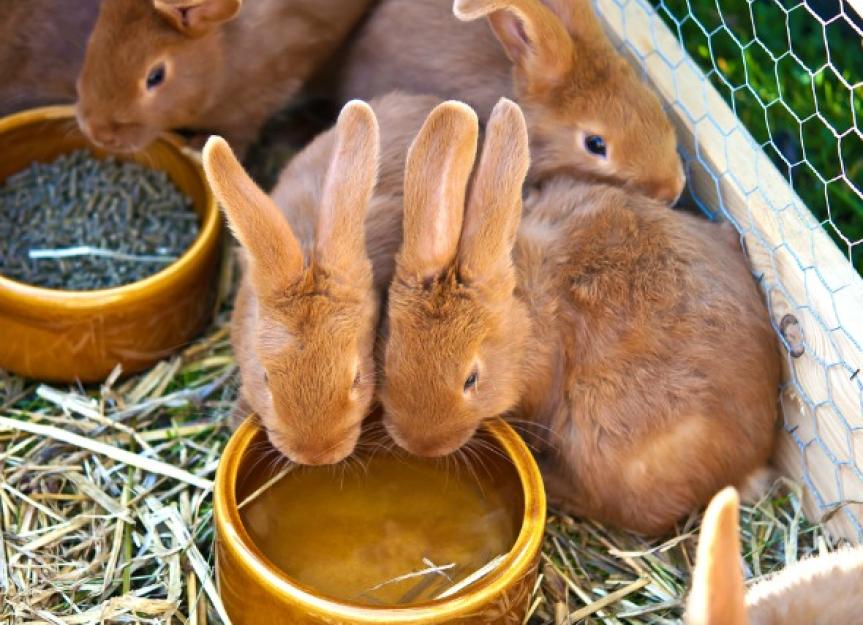Excess Urine and Excess Thirst in Rabbits
多尿、烦渴的兔子
Polyuria is defined as greater than normal urine production, and polydipsia as greater than normal water consumption. The average normal water intake for rabbits is 50-150 mL/kg body weight daily. This is the general expectation of water consumption, since rabbits that are fed large amounts of water-containing foods, such as leafy vegetables, will drink less water than those that are on a dry diet of hay and pellets. Normal urine production is generally expected to be between 120-130 mL/kg body weight per day.
The balance between urine production and thirst are controlled by interactions between the kidneys, pituitary gland, and the hypothalamus center in the brain. Excess thirst usually occurs as a result of excess urination, as the body responds to the loss of fluid and attempts to to maintain hydration. The rabbit’s plasma fluids become highly concentrated, and this activates the thirst mechanisms. Occasionally, excess urine occurs as the result of excess thirst. In this situation, blood plasma becomes very diluted because of the excessive water intake, stimulating the center that causes frequent urination. This condition mainly affects the kidney and the heart system.
Symptoms and Types
- Excessive thirst – drinking much more than normal
- Excessive and frequent urination, possibly with occasional urinary incontinence
Causes
- Renal (kidney) failure
- Hepatic (liver) failure
- Drugs
- Diabetes
- Large quantities of sodium chloride
- Behavioral problems, etc.
Diagnosis
There are several possible causes for polyuria and polydipsia, so your veterinarian will most likely use differential diagnosis to find the underlying cause. This process is guided by deeper inspection of the apparent outward symptoms, ruling out each of the more common causes until the correct disorder is settled upon and can be treated appropriately. A complete blood profile will be conducted, including a chemical blood profile, a complete blood count, and a urinalysis. Visual diagnostics will include ultrasonography and X-ray imaging of the abdominal region. Your veterinarian will be looking for some of the more obvious and common causes, like crystals (stones) in the urine and/or urinary tract, bacterial infection, and pus cells in the urine, indicative of an immune reaction to an infection in the urinary organs.
Treatment
It is imperative to continue providing water until the mechanism of the disease and the cause of it are clear and the appropriate medications can be prescribed. Encourage plenty of oral fluid intake by offering your rabbit fresh water, wetting leafy vegetables, or flavoring water with vegetable juice. Offer a large selection of fresh, moistened greens such as cilantro, romaine lettuce, parsley, carrot tops, dandelion greens, spinach, collard greens, and good-quality timothy and grass hay instead of alfalfa hay. If your rabbit cannot or will not ingest enough food and water on its own to recover, you will need to maintain fluid levels and hydration by stomach tube feeding of water and nutrients.
If kidney stones were found to be the underlying cause of the polyuria, your veterinarian will instruct you to decrease calcium sources, at least until the problem is resolved.
Dehydration can rapidly become life threatening. To make sure that your rabbit is sufficiently hydrated, you will need to commit to frequent monitoring of urine output and water intake throughout the day.
Help us make PetMD better
Was this article helpful?
